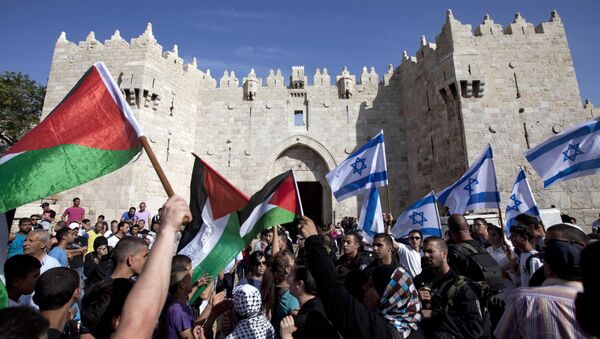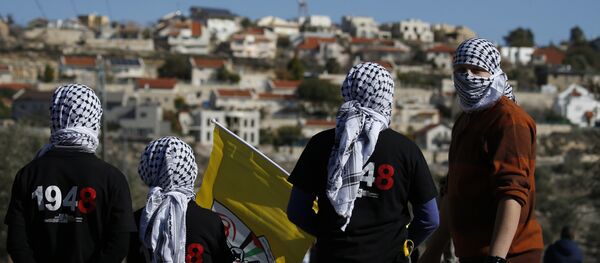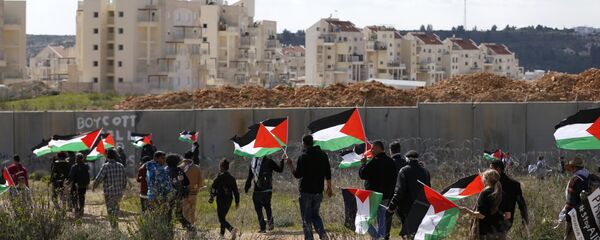MOSCOW (Sputnik) — Israel is attempting to lead the peace process with Palestine into a "dark tunnel," Palestinian Ambassador to Russia Abdel Hafiz Nofal told Sputnik on Thursday.
"Anyone who follows the political situation in the Middle East could have noticed that Israel seeks to lead this process into a dark tunnel," Nofal said.
He named Israeli Prime Minister Benjamin Netanyahu's recent calls to "disband" the United Nations Relief and Works Agency for Palestine Refugees in the Near East (UNRWA) as one of the examples. Israeli lawmakers also voted to deduct money transfers to the Palestinian Authority this week, he added.
"We should not forget that Israel is still continuing to expand its settlement activities in the West Bank and the rest of Palestine," Nofal said.
The envoy stressed the need to "increase international efforts," noting that "despite the importance of more than 20 years of negotiations with the Israelis, we are moving into a very difficult dimension."
"We believe that an international conference under the partnership efforts of Moscow and Washington is needed to solve this [the Israeli-Palestinian conflict]," Nofal said, offering Moscow as a possible venue to hold talks.
He stressed that "the final decision should be reached on the basis of this conference under the Russian and US auspices and with the participation of all interested parties."
"We are working on a project to supply Russian instead of Israeli oil and petrochemical products to Palestine," Nofal said.
Certain agreements have been reached during Palestinian National Authority leader Mahmoud Abbas' visit to Russia on May 11, the envoy noted.
"We really hope that we will soon be able to see serious results, I look at it positively," he said.
Palestine is grateful to Moscow for its decision not to move its embassy in Israel from Tel Aviv to Jerusalem until the two Middle Eastern states resolve their long-standing territorial dispute, Nofal told Sputnik.
On June 1, US President Donald Trump signed a waiver to keep the US diplomatic mission in Israel in Tel Aviv for at least six months instead of moving it to Jerusalem, despite his election campaign promises to make the move when elected into office. Last Thursday, Jerusalem Affairs and Environmental Protection Minister Ze'ev Elkin suggested that Russia could use this opportunity to become the first country to relocate its embassy to Jerusalem.
"We are grateful to the Russian authorities and to the Foreign Ministry for this decision. As far as we know, the Russian Foreign Ministry had considered the possibility of Jerusalem becoming the capital of two states at once. We highly appreciate the position of Russia on keeping the Russian embassy in Tel Aviv until the decision to establish the Palestinian state within 1967 borders and a capital in East Jerusalem has been carried out," Nofal said.
The ambassador noted that the relocation of the Russian embassy is a secondary issue, while the recognition of the Palestinian borders, as they were in 1967, and of East Jerusalem as its capital is the primary matter.
"We, Palestinians, often say that Jerusalem should become the city that is open to all: Christians, Muslims, Jews, a city that is open politically and economically. However, it is only possible after Israel recognizes Palestine's right to self-determination," the ambassador said.
Israeli Defense Minister Avigdor Lieberman said Sunday that Israel had approved over 8,000 new homes since the beginning of the year, with over 3,000 marked for immediate construction. This is a record volume of construction unseen in over two decades.
"Undoubtedly [such actions hinder the settlement of the Palestinian-Israeli conflict]," the ambassador said.
Nofal said that Palestine was seriously worried about this decision to construct new homes.
"In particular, we are afraid that following this active expansion, we will simply have nothing to negotiate with as they [Israel] will capture all of the land… If all this territory [of the West Bank] is annexed by Israel, what will we negotiate about with them then?" the ambassador said.
"In the near future – maybe in August – a large state-level delegation will visit Palestine. It will include representatives of state institutions, ministries and private companies of Russia," Nofal said.
Asked about the areas in which the two countries could establish effective cooperation, the ambassador mentioned tourism as the primary target.
"Now we are working on holding a large conference in Moscow this year. Its goal is to expand Russia’s presence on the tourist market in Palestine. For us it is a very important issue. There are opportunities, and we hope to see the results soon," Nofal said.
Additionally, Nofal said that the creation of special economic zones would allow Russia to sell its products in other countries of the Arab world through Palestine.
"In addition, in Palestine, it is possible to create a Russian plant for the production of medicines which are produced neither in Palestine nor in the region. The plant could distribute the products not only in Palestine but also in neighboring countries," Nofal said.
The ambassador added that the sides were discussing the possibility of Palestine establishing two plants for the production of medicine in Russia, as well as holding joint events.
The USSR recognized Palestine in 1988, and continued its support even after the collapse of the Soviet Union.
Russia and Palestine signed an agreement on the establishment of the intergovernmental Russian-Palestinian commission on trade and cooperation in April 2015.
The Israeli-Palestinian peace process has been a matter of global concern with the issue engaging international mediators. The Middle East Quartet, consisting of the United Nations, the United States, Russia and the European Union, has been active since 2002. The Quartet is focused on support for Palestine in developing economy, public institutions, rule of law in the West Bank and Gaza.




